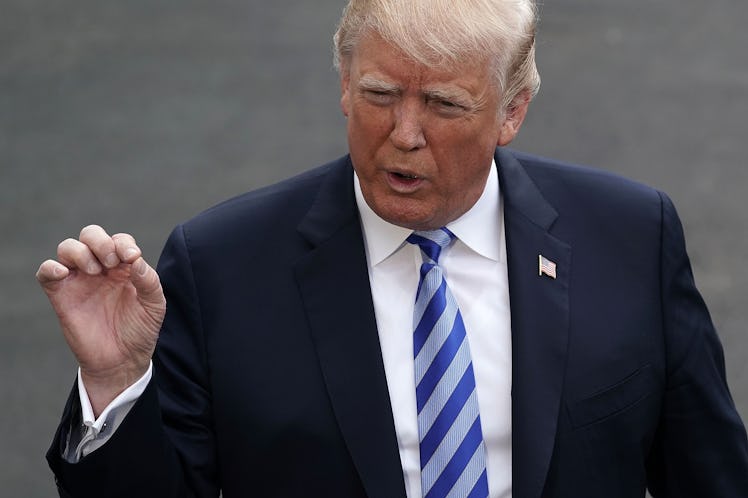
This Is What You Need To Know About Trump Pulling Out Of The Iran Nuclear Deal
On Tuesday, May 8, President Donald Trump made an announcement about the Iran nuclear deal, and the consequences could be dire. The president signaled his intention to exit the agreement, which had put brakes on Iran's nuclear program under President Barack Obama. The announcement was made at the White House at 2 p.m. ET Tuesday.
UPDATE: Following the president's announcement, Iran announced that they will continue negotiating with the remaining nations in the deal about potentially keeping up with it. President Hassan Rouhani also announced that should the negotiations not go smoothly, the nation may begin enriching uranium again.
EARLIER: "I am announcing today that the United States will withdraw from the Iran nuclear deal," Trump said in his speech Tuesday, adding that he would be instituting the highest level of economic sanction. "Any nation that helps Iran in its nuclear quest" could also be held accountable by U.S. sanctions.
In his remarks at the White House Tuesday, Trump listed off grievances against Iran and discussed what he perceived as the deal's shortcomings.
"In theory, the so-called Iran deal was supposed to protect the US and its allies from the lunacy of an Iranian nuclear bomb," said Trump in his speech. "In fact, the deal allowed Iran to continue enriching uranium." He called the deal a "great embarrassment to citizens of the United States," and added, "It didn't bring calm, it didn't bring peace, and it never will."
Trump already motioned he would be exiting the agreement prior to the announcement, telling French President Emmanuel Macron earlier Tuesday of his intention to do so, according to The New York Times. The full breadth and extent of the consequences for his decision to pull out of the deal aren't clear, but will likely be serious.
Trump has long threatened to remove the U.S. from the deal, but until now, hasn't taken that step. The deal, formally called the Joint Comprehensive Plan of Action (JCPOA), was a chief achievement of the Obama administration. The agreement was signed in 2015 by Russia, China, the U.K., France, Germany, and the U.S., and agreed to lift economic sanctions again Iran in exchange for the country's refraining from developing its stockpile of enriched uranium, which is used for nuclear weapons.
Under the terms of the agreement, the president of the United States must recommit every four months to waive economic sanctions placed on Iran's bank. Trump's announcement Tuesday comes just a few days shy of the next sanction-waiving deadline, which is May 12. It was unclear whether Trump would simply reimpose sanctions without actually removing the country entirely from the agreement, but given that the latter is the route he chose, it complicates the fate of the program for the other countries that remain a party to it.
In October 2017, Trump declined to re-certify that Iran had been meeting its requirements in the agreement, but no further action was taken at the time.
Trump's decision to pull of out the agreement is likely to strain the country's relationships with the other countries that signed onto the agreement — chiefly, its European allies, as well as Russia and China. By exiting the agreement, Trump leaves the door open for a host of outcomes, and how the chips will fall has yet to be determined. As an unnamed senior European diplomat told The Hill, Trump's failure to waive the sanctions "will have various consequences that I think we have yet fully to understand and spell out."
Per a tweet by The Wall Street Journal's Farnaz Fassihi, former Deputy Secretary of State Tony Blinken called the move "a monumental mistake."
As Sen. Jeff Merkley, Democrat of Oregon, pointed out in a tweet Tuesday, another potential side effect of Trump pulling out of the deal is weakening the country's delicate negotiation with North Korea, whose nuclear program the U.S. is also seeking to curtail.
Trita Parsi, president of the National Iranian-American Council, did not sugarcoat the gravity of the situation. Of Trump's decision whether to nix the deal, he said in a tweet, "If he kills it — as most expect he will do — he will put the US on a path towards War with Iran. Period."
"Trump has demolished America's credibility & paved the way for Iran to re-start its nuclear program," wrote Samantha Power, former U.S. Ambassador to the United Nations, in a tweet on Tuesday. "Trump has done the unthinkable: isolated the US & rallied the world around Iran. The costs of using military force have only increased."
The move will also have an impact for Iranians who have been fighting for social justice. As the NIAC says in a statement: "This is potentially the biggest crime of Trump's decision — limiting the agency of Iran's own people to choose peaceful political evolution in order to address their grievances."
But the president sought to reassure his commitment to Iranian nationals. "The people of America stands with you," Trump said in his speech Tuesday. "The future of Iran belongs to its people. ... They deserve a nation that does justice to its dreams."
The question now becomes whether the other five nations in the agreement will continue to uphold their commitments and what impact the U.S. exit will have on their ability to do so and in the nation's international relationships.
In his speech Tuesday, Trump signaled a willingness to revisit the deal and renegotiate, but it's unclear when or if that would happen. There is talk of the possibility that Trump could return with a new deal to replace the old one, but that remains to be seen.